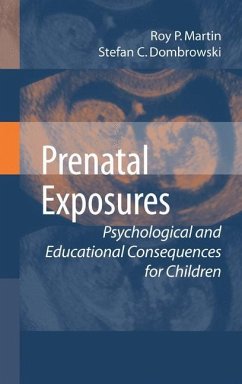Children are being diagnosed with psychopathologies at alarming rates. Not surprisingly, their behavioral and educational outcomes are increasingly compromised. The financial costs of treating childhood disabilities are spiraling out of control, and the emotional and social toll on students, families, schools, the penal system, and society as a whole is staggering.
With proper care during pregnancy, medical professionals can now help expectant mothers prevent many physical birth defects. But prevention and intervention techniques remain elusive for abnormal fetal development that manifests later in life as behavioral problems. Researchers in the field of behavioral teratology continue to search for answers - prevention and intervention techniques - that will lead to improved behavioral and education outcomes for children.
In this first compendium in the growing literature of behavioral teratology, readers will discover an easy-to-access, concise presentation that: Synthesizes important findings that help explain why prenatal events may result in abnormal behavior and learning disabilities later in life; Examines the role of prenatal perturbations, along with genetics and the postnatal roles of caretakers and the social environment, in light of how each may - individually or together - contribute to conditions as varied as dyslexia, schizophrenia, fetal alcohol syndrome, and autism; Ensures that effective prevention and intervention can occur during the prenatal phases of development; Addresses the research needs in behavioral teratology that are likely to lead to discoveries that may ensure the birth of healthier babies who develop normally across the lifespan; Provides a brief medical glossary that details terminology specifically related to fetal development and birth.
With its multidisciplinary approach, this volume is a must-have resource for clinical child and school psychologists; educational professionals; medicalpractitioners; social workers and counselors as well as researchers and graduate students in these areas. In addition, pediatricians, psychiatrists, and other medical professionals - including such disciplines as epidemiology, reproductive biology, psychiatry, pediatrics, obstetrics, neonatology, among others - will find this book highly useful.
With proper care during pregnancy, medical professionals can now help expectant mothers prevent many physical birth defects. But prevention and intervention techniques remain elusive for abnormal fetal development that manifests later in life as behavioral problems. Researchers in the field of behavioral teratology continue to search for answers - prevention and intervention techniques - that will lead to improved behavioral and education outcomes for children.
In this first compendium in the growing literature of behavioral teratology, readers will discover an easy-to-access, concise presentation that: Synthesizes important findings that help explain why prenatal events may result in abnormal behavior and learning disabilities later in life; Examines the role of prenatal perturbations, along with genetics and the postnatal roles of caretakers and the social environment, in light of how each may - individually or together - contribute to conditions as varied as dyslexia, schizophrenia, fetal alcohol syndrome, and autism; Ensures that effective prevention and intervention can occur during the prenatal phases of development; Addresses the research needs in behavioral teratology that are likely to lead to discoveries that may ensure the birth of healthier babies who develop normally across the lifespan; Provides a brief medical glossary that details terminology specifically related to fetal development and birth.
With its multidisciplinary approach, this volume is a must-have resource for clinical child and school psychologists; educational professionals; medicalpractitioners; social workers and counselors as well as researchers and graduate students in these areas. In addition, pediatricians, psychiatrists, and other medical professionals - including such disciplines as epidemiology, reproductive biology, psychiatry, pediatrics, obstetrics, neonatology, among others - will find this book highly useful.
From the reviews:
"Martin and Dombrowski's new book, Prenatal Exposures: Psychological and Educational Consequences for Children (Springer, 2008), is well documented and incisive. They collect in one volume an impressive amount of scientific evidence, and they do not stray far from this evidentiary base when drawing conclusions and identifying trends that may inform future research and current practices. Thanks to these characteristics this text is authoritative and, therefore, of particular importance for graduate training in pediatrics, child and school psychology, nursing, and preparation of other professionals who commonly have to estimate the potential impact of proven and purported teratogens. I congratulate the authors on this accomplishment and recommend highly their text for researchers and clinicians alike."
R.W. Kamphaus, Ph.D., Dean and Distinguished Research Professor College of Education, Georgia State University
"This text represents a landmark contribution to pediatric and developmental psychology. Understanding the link between prenatal development and lifelong outcomes has become integral to global medical and psychological practice. The authors offer a timely, in-depth, and succinct perspective important for clinicians, practitioners, and policy makers."
Martin Mrazik, Ph.D., R.Psych., Clinical Neuropsychologist, University of Alberta
"This volume presents a comprehensive and well-organized integration of research conducted across many fields of study. The book is remarkable in that it strikes a unique balance between scholarship and practicality. Practitioners and students from many disciplines will find this text to be highly informative, useful, and readable."
Thomas J. Power, Ph.D., Professor of School Psychology in Pediatrics Director, Center for Management of ADHD, The Children's Hospital of Philadelphia, Universityof Pennsylvania
"This book provides valuable insights into the challenges facing many of our children, our most valuable assets. As one can quickly see, the playing field is not a level one, even long before the child is born. Many of the factors addressed in this book are interlinked to extreme poverty and teen pregnancy, two of our most pressing national emergencies. Physicians, educators, child advocates and policy makers will all find this information crucial in their work and compelling in their search for the transformation of our future."
Elisa Silverstein, MD, Assistant Professor of Pediatrics, University of Missouri--Kansas City School of Medicine Attending Physician Pediatric Emergency Department Children's Mercy Hospital
"The book provides a concise overview of the research that has been conducted in this relatively young field of study. ... the book will please researchers and graduate students interested in human development, particularly those interested in cognitive and behavioral disorders. For the beginning researcher ... the book provides an excellent introduction to the topic and could be an ideal book to read when one is in the process of deciding on a long-term program of research." (Shelia M. Kennison, PsycCRITIQUES, Vol. 54 (1), January, 2009)
"I am currently writing up my PhD on maternal lifestyle in pregnancy and child behavioural development and thought I would e-mail to let you know that your book "Prenatal Exposures" has been a fantastic resource! It is a great summary of what we know of these prenatal influences, and I think the writing style is such that it can be readily understood external to the academic context."
Monique Robinson, Research Officer/PhD Candidate, Telethon Institute for Child Health Research West Perth, Australia
From the reviews: "Martin and Dombrowski's new book, Prenatal Exposures: Psychological and Educational Consequences for Children (Springer, 2008), is well documented and incisive. They collect in one volume an impressive amount of scientific evidence, and they do not stray far from this evidentiary base when drawing conclusions and identifying trends that may inform future research and current practices. Thanks to these characteristics this text is authoritative and, therefore, of particular importance for graduate training in pediatrics, child and school psychology, nursing, and preparation of other professionals who commonly have to estimate the potential impact of proven and purported teratogens. I congratulate the authors on this accomplishment and recommend highly their text for researchers and clinicians alike."R.W. Kamphaus, Ph.D., Dean and Distinguished Research Professor College of Education, Georgia State University "This text represents a landmark contribution to pediatric and developmental psychology. Understanding the link between prenatal development and lifelong outcomes has become integral to global medical and psychological practice. The authors offer a timely, in-depth, and succinct perspective important for clinicians, practitioners, and policy makers."Martin Mrazik, Ph.D., R.Psych., Clinical Neuropsychologist, University of Alberta "This volume presents a comprehensive and well-organized integration of research conducted across many fields of study. The book is remarkable in that it strikes a unique balance between scholarship and practicality. Practitioners and students from many disciplines will find this text to be highly informative, useful, and readable."Thomas J. Power, Ph.D., Professor of School Psychology in Pediatrics Director, Center for Management of ADHD, The Children's Hospital of Philadelphia, University of Pennsylvania "This book provides valuable insights into the challenges facing many of our children, our most valuable assets. As one can quickly see, the playing field is not a level one, even long before the child is born. Many of the factors addressed in this book are interlinked to extreme poverty and teen pregnancy, two of our most pressing national emergencies. Physicians, educators, child advocates and policy makers will all find this information crucial in their work and compelling in their search for the transformation of our future."Elisa Silverstein, MD, Assistant Professor of Pediatrics, University of Missouri--Kansas City School of Medicine Attending Physician Pediatric Emergency Department Children's Mercy Hospital "The book provides a concise overview of the research that has been conducted in this relatively young field of study. ... the book will please researchers and graduate students interested in human development, particularly those interested in cognitive and behavioral disorders. For the beginning researcher ... the book provides an excellent introduction to the topic and could be an ideal book to read when one is in the process of deciding on a long-term program of research." (Shelia M. Kennison, PsycCRITIQUES, Vol. 54 (1), January, 2009) "I am currently writing up my PhD on maternal lifestyle in pregnancy and child behavioural development and thought I would e-mail to let you know that your book "Prenatal Exposures" has been a fantastic resource! It is a great summary of what we know of these prenatal influences, and I think the writing style is such that it can be readily understood external to the academic context."Monique Robinson, Research Officer/PhD Candidate, Telethon Institute for Child Health Research West Perth, Australia








